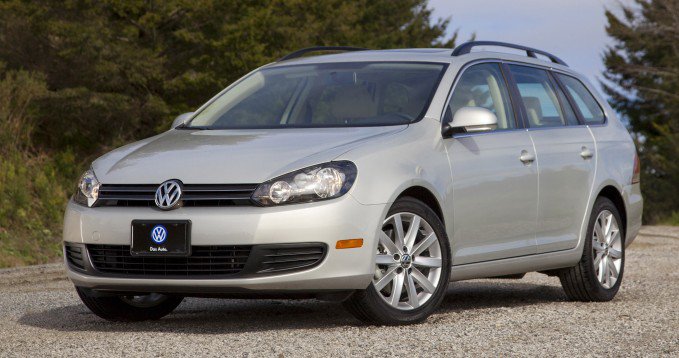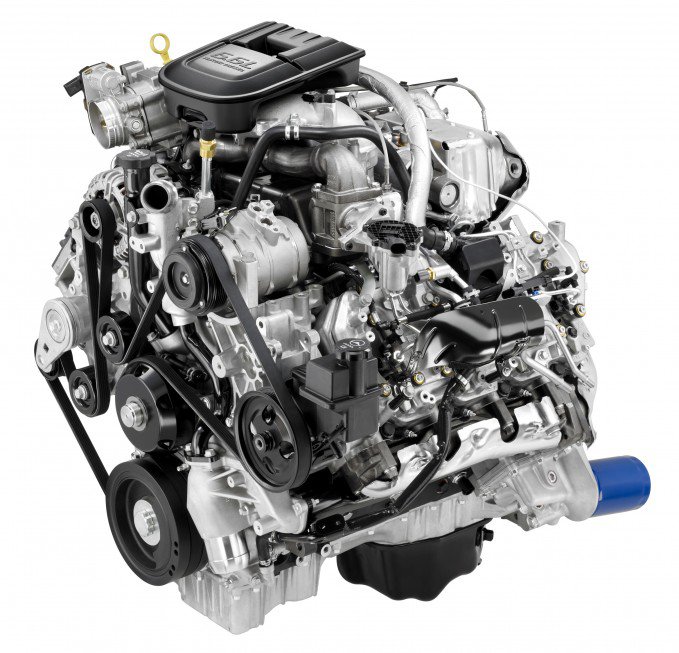Diesel engines are something of a mystery to many drivers, especially in North America where gasoline is the king of motoring fuels. Of course compression-ignition has a host of benefits compared to spark plug-equipped powerplants, not the least of which is dramatically better efficiency.
Generous low-RPM torque, greater driving range and longevity are a handful of other advantages associated with diesel engines. But these upsides are offset by a few black marks, things like the elevated price of fuel, higher initial costs and the need to mess around with DEF, which is short for diesel exhaust fluid; in global markets it’s often referred to as AdBlue. What is this mysterious liquid and why is it required in certain vehicles?
DEFlecting Dirt
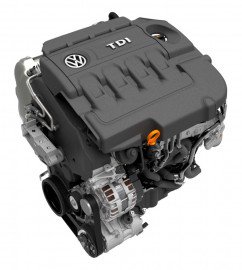
“You have hydrocarbons, carbon monoxide … [these] tend to be the higher pollutants in gasoline engines,” said Doug Skorupski, powertrain strategy manager at Volkswagen of America, a company that’s been a leader in the clean-diesel movement. He also said “[A] three-way catalytic converter is needed to address those [pollutants].”
SEE ALSO: Is Carbon Buildup a Problem with Direct Injection?
But unlike gasoline-burning powerplants Skorupski said, “Diesels tend to be higher in NOx (nitrogen oxides) and particulates,” nasty combustion byproducts that can lead to all kinds of health issues such as respiratory trouble and heart disease. Sky-high compression ratios and lean mixtures are the reasons for these tailpipe emissions and largely why diesels are so economical.
DEFending Diesels
Fortunately all is not lost. Thanks to a chemical reaction known as selective catalytic reduction (SCR) diesel drives can have their proverbial cake and eat it, too.
The SCR process is where DEF comes into play. “It’s an ammonia-based solution carried in water … [that’s used] for emissions reduction,” said Gary Arvan, GM’s Duramax chief engineer. Further clarifying this he said it’s about 32.5 percent ammonia.
Avoiding a lengthy and complicated explanation of how this process works, clean diesels are equipped with a small reservoir containing a few gallons of DEF. As the engine runs small amounts of this fluid get sprayed into the exhaust stream where it reacts with a special catalyst and the gasses contained therein. The chemical reaction that occurs converts harmful substances into less damaging ones.
“It’s essentially the most effective [way] of reducing NOx,” Arvan said, noting that nasty byproducts like NO and NO2 get converted into harmless N and H2O. “The end goal is nitrogen and water,” he said. “In many situations what’s coming out of the tailpipe, from a particle standpoint, is cleaner than what’s coming into the engine.”
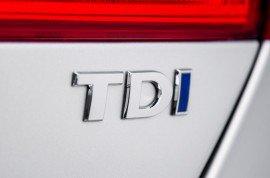
“You absolutely need it (SCR) to meet the emissions regulations,” Arvan said. According to him between 1994 when Tier 1 rules started phasing in and 2017 when Tier 3 comes on line there will be “a nearly 90 percent reduction … of allowable NOx from the tailpipe.”
“With the model year ‘15 we have a brand new diesel engine generation and that one uses the SCR,” said Skorupski; its predecessor got by with just a particulate filter. In the near future he said there will be a lot of commonality between American and European emissions regulations, something that should make it easier for companies to sell diesels in both markets. SCR technology will be required on European vehicles for them to meet upcoming legislation.
DEFinite Maintenance
One other downside to modern clean diesels is that they require a little more maintenance than their gasoline-burning counterparts. Drivers have to keep their DEF tanks full in order to remain emissions compliant. It’s extra worry and expense, though manufacturers have worked to keep both to at a minimum.
SEE ALSO: What Really Goes on at Dealerships, Part II
Automakers achieve this by aligning DEF service with other scheduled maintenance, so when you take your car or truck in for an oil change the technicians can also top off the fluid. With GM’s heavy-duty trucks Arvan said customers will typically get around 1,000 miles per gallon of DEF, though not surprisingly that figure is reduced in extreme usage scenarios like heavy towing.
“If our customer doesn’t want to touch DEF they don’t have to touch DEF,” said Arvan, though it’s super easy. He said, “It’s like filling washer fluid.”
Mirroring what his GM colleague noted Skorupski said, “It’s all based on duty cycle,” though normally VW drivers would “have that AdBlue tank refilled at a service interval, which is 10,000 miles.”
But let’s say your vehicle is out of warranty or you’d rather do your own maintenance, are you out of luck? Not at all because exhaust fluid is quite affordable. “I know the auto-parts stores, if you were to buy it yourself at one of these places it’s roughly $5.00 per gallon,” said Skorupski. Likewise Arvan noted, “It’s less than a penny a mile to run DEF.”
SEE ALSO: 2015 Volkswagen Touareg TDI Review
Given the low price of this fluid you should ALWAYS fill the tank with the appropriate stuff. Some drivers may try to cheat the system by topping off with water to save a few bucks but this is not a good idea. Arvan said, “The regulations make it so that we have to monitor how well the system is performing.” If a vehicle’s onboard sensors determine that the catalyst is not functioning properly you could get a check-engine light or worse, potentially damage the emissions system.
Fluid DEFiciency
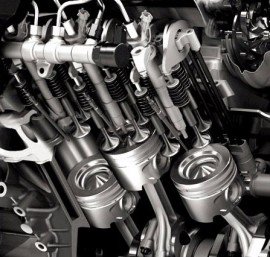
Fortunately you get plenty of warning to fill the DEF tank. Vehicles will alert you thousands of miles before they’re out of fluid. Skorupski said, “There’s a series of warnings that occur when the tank reaches a certain level.” After that point the engine will no longer start.
If you need it DEF it’s widely available at auto-parts stores, dealerships and even truck stops. In future selective catalytic reduction will likely be around for many years to come. “It’s just the best technology available,” said Arvan. “There isn’t anything that we see replacing SCR … Nothing else is capable of that right now.” If you want to reap the myriad benefits of driving a modern diesel it’s good to be familiar with DEF.







